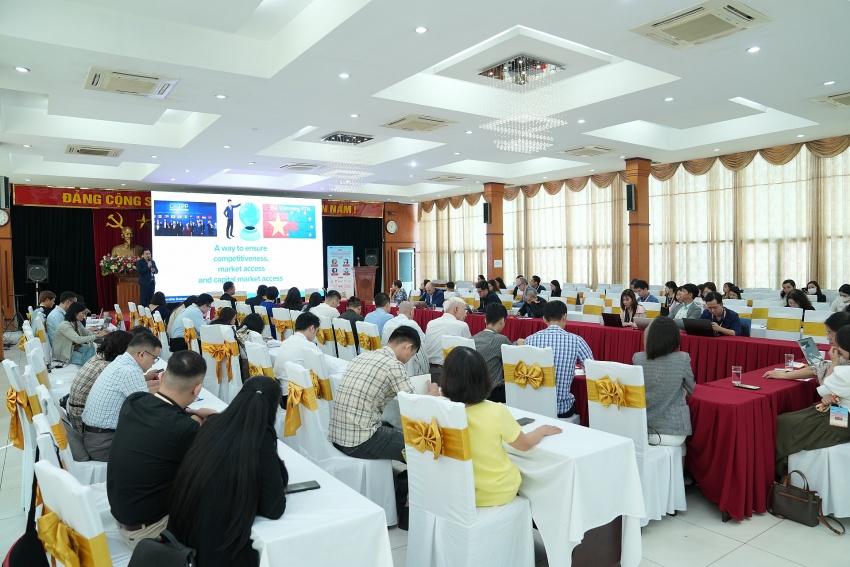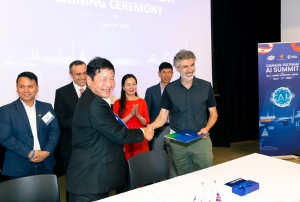Business encouraged to implement responsible practices
 |
The conference was a part of the Win-Win for Vietnam project, implemented by RED Communication Vietnam and ProNGO! e.V. (Germany)
ProNGO! e.V. aims to improve the overall performance of non-governmental organisations' activities by combining their initiatives with the expertise of business professionals. The key to its good project work is a multidisciplinary team consisting of experts from a diverse range of fields.
The project is approved by the Vietnam Union of Science and Technology Associations and the Vietnamese authorities.
According to the project's mission and framework, in this final year, the project organised two conferencesin Ho Chi Minh City and Hanoi to analyse policies and gather suggestions from related stakeholders, including businesses, civil society organisations, the Vietnam Consumer Protection Organisation, and the Vietnam Chamber of Commerce and Industry, to propose policy recommendations to the public sector.
They were organised following Prime Minister Pham Minh Chinh's Decision No.843/QD-TTg on July 14 to circulate the national action plan (NAP) and finalise policies and laws to promote responsible business practices (RBPs) in Vietnam over the 2023-2027 period.
To gain more experience on responsible business from an international perspective, the organising board needed further information on specific contexts and the most notable components from the business sector.
Tran Nhat Minh, director of RED Communication said, “These conferences provided information and international experience on building and implementing policies to promote responsible business practices from the EU and Thailand. In addition, they were a forum to consult businesses, social organisations, and experts on promoting responsible business practices in the Vietnamese context.”
RBPs are an important component in achieving the dual goals of economic growth and sustainable development. Therefore, the United Nations has introduced guidelines and principles on business and human rights on a global scale and aims to support countries in concretising them into each NAP.
As of October 2019, 25 countries have included responsible business issues in their national agendas. Among these, 23 have established NAPs with specific goals that are appropriate in their national context. In Southeast Asia, Thailand is the first country to develop a NAP on business and human rights – issued in September 2019 and updated in 2022.
Brenda Candries, programme manager of the Delegation of the European Union to Vietnam said, “The European Union is also proposing a new Law on Corporate Sustainability Due Diligence. This directive, which was proposed last February, will advance the green transition and protect human rights in Europe and beyond. It sets out a corporate due diligence duty to identify, prevent, or mitigate human rights issues and environmental impacts in companies' operations, subsidiaries, and value chains inside and outside Europe.”
“Small- and medium-sized enterprises do not fall under the direct scope of the draft directive. However, they may be impacted if they form part of the value chain of larger companies. This is something Vietnamese businesses should be aware of,” she said.
At the end of the conferences, the organising board summarised the suggestions from participants and made further policy recommendations on RBPs in Vietnam.
 | FPT and Mila expand strategic partnership to advance responsible AI On June 2, Vietnam’s largest IT service provider, FPT, and Mila - Quebec AI Institute announced the renewal of a three-year strategic partnership agreement to promote responsible AI. |
 | The growth of business messaging: how it’s improving business performance in Vietnam People and businesses have been communicating for years, mainly through face-to-face communication. But technology has changed all of that, including where and how people and businesses communicate. As the world grows more mobile first, people’s expectations of businesses are also evolving. |
 | Tax authorities to make e-invoicing a common practice Vietnam’s tax authorities are working to make e-invoicing a common practice among business establishments nationwide as e-invoices generated from cash registers (ECR) make tax collection more efficient and manageable. |
 | Top 500 private firms responsible for 18.4 per cent of revenue Vietnam's top 500 private enterprises (VPE500), were responsible for 18.4 per cent of the nation's domestic private sector revenue between 2019 and 2021, according to an August 30 report from the Institute for Development Strategy and the Department of Industrial and Construction Statistics, under the General Statistics Office. |
What the stars mean:
★ Poor ★ ★ Promising ★★★ Good ★★★★ Very good ★★★★★ Exceptional
Related Contents
Latest News
More News
- State corporations poised to drive 2026 growth (February 03, 2026 | 13:58)
- Why high-tech talent will define Vietnam’s growth (February 02, 2026 | 10:47)
- FMCG resilience amid varying storms (February 02, 2026 | 10:00)
- Customs reforms strengthen business confidence, support trade growth (February 01, 2026 | 08:20)
- Vietnam and US to launch sixth trade negotiation round (January 30, 2026 | 15:19)
- Digital publishing emerges as key growth driver in Vietnam (January 30, 2026 | 10:59)
- EVN signs key contract for Tri An hydropower expansion (January 30, 2026 | 10:57)
- Vietnam to lead trade growth in ASEAN (January 29, 2026 | 15:08)
- Carlsberg Vietnam delivers Lunar New Year support in central region (January 28, 2026 | 17:19)
- TikTok penalised $35,000 in Vietnam for consumer protection violations (January 28, 2026 | 17:15)

 Tag:
Tag:




















 Mobile Version
Mobile Version